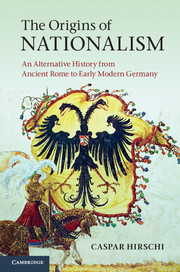Book contents
- Frontmatter
- Contents
- Figures
- Preface
- 1 Introduction
- 2 The modernist paradigm: strengths and weaknesses
- 3 Foundations of a new nationalism theory
- 4 Killing and dying for love: the common fatherland
- 5 Competing for honour: the making of nations in late medieval Europe
- 6 The nationalist transformation of borders and languages
- 7 Humanist nationalism
- 8 A German Emperor for the German people
- 9 Nation and denomination
- 10 Conclusion
- Bibliography of works cited
- Index
7 - Humanist nationalism
Published online by Cambridge University Press: 05 June 2012
- Frontmatter
- Contents
- Figures
- Preface
- 1 Introduction
- 2 The modernist paradigm: strengths and weaknesses
- 3 Foundations of a new nationalism theory
- 4 Killing and dying for love: the common fatherland
- 5 Competing for honour: the making of nations in late medieval Europe
- 6 The nationalist transformation of borders and languages
- 7 Humanist nationalism
- 8 A German Emperor for the German people
- 9 Nation and denomination
- 10 Conclusion
- Bibliography of works cited
- Index
Summary
Of course, every Frenchman is a Barbarian, but not every Barbarian is a Frenchman.
Petrarch, Invective against the One who Maligns Italy, 1373Ours are the triumphs of the Goths, the Vandals and the Franks. Ours is the glory and honour of their empires founded in the most illustrious Roman provinces and even in Italy and Rome, the Queen of all cities.
Beatus Rhenanus, Letter to Bonifaz Amerbach, 1531Not many people today would say that the terms humanism and nationalism make a good match. Quite the opposite, most would think that the two words completely contradict each another. Such a judgement seems correct, if we take the general understanding of humanism as a benchmark. In recent decades, ‘humanism’ and ‘humanist’ have become positively associated with a wide variety of ideas and actions linked to the promotion of human welfare, to the affirmation of human dignity or to the belief in the human capacity for self-improvement through education. Thanks to such fuzzy semantics, candidates for the honorary title of humanist can be taken from a diverse pool of people, including humanitarian aid workers, elder statesmen and intellectuals. The only conditions these candidates usually have to meet are a public presence, an altruistic attitude – and an anti-nationalist stance. Indeed, the caricature of the self-absorbed, morally indifferent and boneheaded nationalist helps to define the modern-day humanist ex negativo, thereby compensating for the lack of a distinctive profile of their own.
From a historian’s point of view, the modern assimilation of humanism to humanitarianism and the fashioning of humanists as do-gooders and multiculturalists are not necessarily objectionable. They only become problematic when confused with the historiographical term of ‘Renaissance humanism’. Unfortunately this happens all too often because modern defenders of ‘humanist’ values like to refer to a genealogy of great minds, whose intellectual legacy they claim to uphold. Among the ‘usual suspects’ they invoke are Giovanni Pico della Mirandola (1463–94), Thomas More (1478–1535) and – above all – Desiderius Erasmus (1466/69–1536). In general, the pictures they paint of these Renaissance humanists are not entirely wrong; however, they tend to be very selective. What is lacking most is historical context.
- Type
- Chapter
- Information
- The Origins of NationalismAn Alternative History from Ancient Rome to Early Modern Germany, pp. 119 - 179Publisher: Cambridge University PressPrint publication year: 2011

